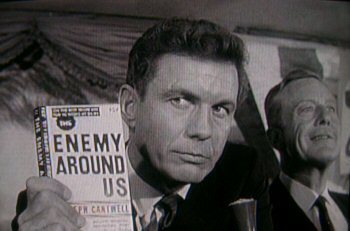We Used to Believe: Fantasies of Institutional Democracy in 1960s Hollywood by Steven Goldman
By Yasmina Tawil
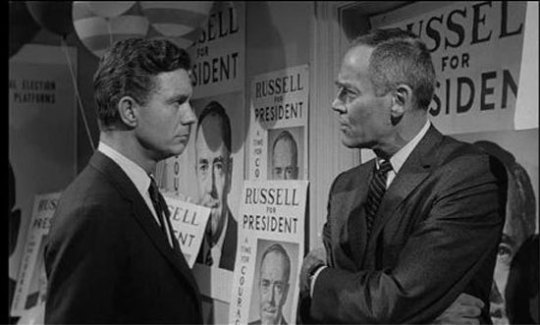
During the last months of his life, President Franklin Delano Roosevelt ordered that the mantelpiece in the White Houses state dining room be inscribed with John Adams prayer: I pray Heaven to bestow the best of Blessings on this House and on all that shall hereafter inhabit it. May none but honest and wise Men ever rule under this roof.
Adams, the second president but the first to inhabit the Executive Mansion, as the White House was more often called in those days, couldnt have known how much urgency we might attach to such a prayer in an age of terrorism, global warming, and nuclear weapons. Nor could he have anticipated the way that the passage of time might alter and sometimes outright distort our perception of presidential honesty and wisdom; our definitions of both might be radically different from his. Our films on presidential politics are a snapshot of our hopes and fears, a way to work out our anxieties through fiction. Two films that emerged in reaction to the election of 1960, Advise & Consent directed by Otto Preminger, and The Best Man, written by Gore Vidal, reflect those anxieties as acutely as any ever made.
Like Freuds cigar, sometimes a film is just a film, of course, and not every presidential portrayal on celluloid betrays a hidden wish or worrymaybe Bill Pullmans fighter-flying Thomas Whitmore in Independence Day (1996) or Harrison Fords combat-veteran James Marshall in Air Force One (1997)both chief executives who take matters into their own handshave a subtext in partisan gridlock during the Clinton years, but more likely theyre just action heroes going with the flow in outlandish films. Sometimes, though, the relationship is on the nose, such as in the 1933 fascist fantasy Gabriel Over the White House, which appeared at roughly the nadir of the Great Depression. Walter Huston plays a lackadaisical playboy president who suffers a near-fatal accident and is reborn as a Mussolini-like figure who solves the countrys problems through sheer force of will (and guns). At about the same time, there was also The Phantom President, a Rodgers and Hart musical, in which no less than the Yankee Doodle Dandy himself, George M. Cohan, reminds convention delegates about to nominate him for president:
My friends, this land is sad today,
It faces want and dearth.
But government of the people,
By the people, for the people,
Shall not perish from the earth.
The chorus answers, Hey, hey, heythats a new thought.
On the calmer end of the spectrum, at a time when Roosevelt was saying he was less concerned with being a great president than with not being the last president, the years 1930-1940 brought no less than three major films about Abraham Lincoln (D.W. Griffiths Abraham Lincoln, starring Walter Huston; John Fords Young Mr. Lincoln, with Henry Fonda portraying Lincoln as lawyer; and John Cromwells Abe Lincoln in Illinois, with Raymond Massey as the titular character) each bearing the reassuring message that when the Republic was last under threat, a hero arose to restore order.

The United States was a far more stable and prosperous proposition during the 1960 presidential campaign season, but the choice between Democratic Senator John F. Kennedy and incumbent Vice-President Richard M. Nixon made it a change election nonetheless. The previous three presidents had been born between 1882 and 1890. Kennedy, 43 years old, or Nixon, 47, would be the first president in United States history born in the 20th century. Whether one agreed or disagreed with the policies of Roosevelt, Harry Truman, or Dwight Eisenhower, in a very real sense the reassuring grandpas who had steered America through the frightening progression of the Depression, World War II, and the Cold War were going away for good.
There were good reasons to doubt both men. If Kennedy won, he would be the youngest elected president in history. While his panache made an appealing contrast with the dowdy Eisenhower, it was also a reminder that he was inexperienced, with an indifferent record in the Senate. Old New Deal Democrats, including Eleanor Roosevelt, doubted Kennedys bona fides. As Arthur Schlesinger Jr. put it, Kennedy seemed too cool and ambitious, too bored by the conditional reflexes of stereotyped liberalism, too much a young man in a hurry. He did not respond in anticipated ways and phrases and wore no liberal heart on his leave. In particular, the Kennedys had failed to repudiate the Red-baiting demagoguery of Senator Joe McCarthy and had, in fact, supported him.
Kennedy was also burdened by inherited doubts. He was a Catholic, and anti-Catholic prejudice was still strong in the country; it had helped defeat Democrat Al Smith in the election of 1928. There was also the looming presence of his father, Joseph Kennedy, a wealthy, unscrupulous climber who had sunk his own presidential ambitions by advising appeasement of Hitler while serving as ambassador to Great Britain at the outset of World War II.
As a Congressman, Senator, and Vice-President who had successfully debated Nikita Khrushchev and stepped in as pinch-president when Eisenhower was ill, Nixon had experience in spades, not that the old general acknowledged it. (Asked at a press conference to name an example of a major idea of [Nixons] that you had adopted, the president replied, If you give me a week, I might think of one. I dont remember.) That experience, though, contained a fair share of disqualifiers. He had pioneered McCarthys tactics, first in his campaigns for the House and Senate, then in the divisive Alger Hiss affair. Due to the revelation of a campaign slush fund, which he combated with the infamous Checkers speech, he seemed to many not just an unscrupulous careerist, but also an example of tawdry, down-market venality. No class, was Kennedys two-word dismissal, an assessment that was echoed in campaign signs that asked, Would you buy a used car from this man? Anticipating Donald Trump, Nixon had tried to rebrand himself so often that one commentator said the question was not if there was a new Nixon or an old Nixon, but whether there is anything that be called the real Nixon, new or old. (James T. Patterson, Grand Expectations, 435.)
Tensions around the election were unsurprisingly stoked by the candidates. Kennedys major theme was the anodyne, Its time for America to get moving again, but in his first televised debate with Nixon, he began by questioning, Lincoln-style, whether the world could continue to exist half slave and half free, asking, Can freedom be maintained under the most severe attack it has ever known? It was as if the Russians were about to march down Pennsylvania Avenue and paint the White House red.
Unsurprisingly, with the old guard fading away and the new guard doing what it could to shatter any sense of serenity, public uncertainty about the election expressed itself in polemical art that asked tough questions about the integrity of the American political system and the quality of men that system produces. Among the first was the novel Advise and Consent by Allen Drury, appearing in 1959. A huge bestseller and inexplicable winner of the Pulitzer Prize, it became a Broadway play the next year, with the film version, directed by Preminger, finished in time for Oscar season in 1961 but held back for contractual reasons until June 1962. Vidals play The Best Man premiered on Broadway on March 31, 1960. The film adaptation, directed by Franklin Schaffner (who had directed the Broadway version of Advise) appeared on April 5, 1964. Significantly, both struggle to find an ending that does not duck the questions the stories pose, and both fail. Over 50 years later, with a presidential election of our own in the offing, we are still asking the questions.
*
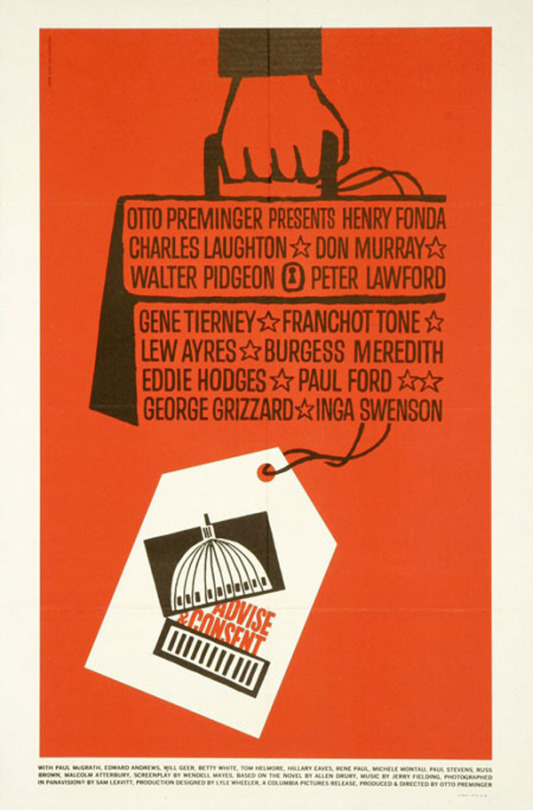
In Advise & Consent, an unnamed, ailing president (Franchot Tone) nominates controversial candidate Robert Leffingwell (Henry Fonda) to succeed the recently deceased Secretary of State. Leffingwell is an intellectual who disdains kneejerk anti-Soviet policies. The former head of two federal agencies, he has made powerful enemies among the senators who must confirm his appointment, chief among them senior senator from South Carolina Seab Cooley (Charles Laughton, visibly ailing in his final role). Leffingwell also has an obsessive advocate in the sneering, peace-at-any-price junior senator from Wyoming, Fred Van Ackerman (George Grizzard). Caught between them is Brigham Anderson (Don Murray), senior senator from Utah, who will chair the subcommittee assigned to conduct the confirmation hearings. A family man with a pretty wife and a young daughter, Anderson is hiding a secret that could influence his vote if one side or the other was to get ahold of it.
The nomination has an outsized importance, not only because the Secretary of State was a key part of the national security apparatus in the early part of the Cold War, but with the chain-smoking president in ill health (shades of Franklin Roosevelt in 1944-1945) and Vice-President Harley Hudson (Lew Ayres, making the most of a small but pivotal part) considered a lightweight, the more dynamic Leffingwell would be positioned as the heir apparent. The question is not only if the nominee will be confirmed, and if he should be confirmed, but if the Senate as an institution is even equipped to supply that advice given the fallible people who inhabit it. The film takes the answer to this last question for granted, then, when forced to confront it, cringes. The result is an inadvertent indictment of the American Constitutional system as a whole.
Advise and Consent, the novel, is a turgid doorstopper with a right-wing ax to grind about appeasement of the Soviet Union, which it perceives to be part of the liberal-elite foreign policy agenda. Leffingwell, a former academic who proudly asserts, Im an egghead. Im not only an egghead, Im a premeditated egghead. I set out to become an egghead and at this moment Im in full flower of eggheadedness, and I hope to spread the spores of egghead everywhere I go, is portrayed as the most naively idealistic accommodationist on the planet Earth in 1959. Early in the novel (on pages 202-203; its a big book), Arly Richardson, senior senator from Arkansas, questions the nominee:
Youve made it rather plain you dont want war.
Who does? Bob Leffingwell said shortly, and Senator Richardson smiled.
Thats right, who does? he said. You mean, I take it, war under any circumstances, is that right?
I cant conceive of a circumstance that would warrant it, Senator.
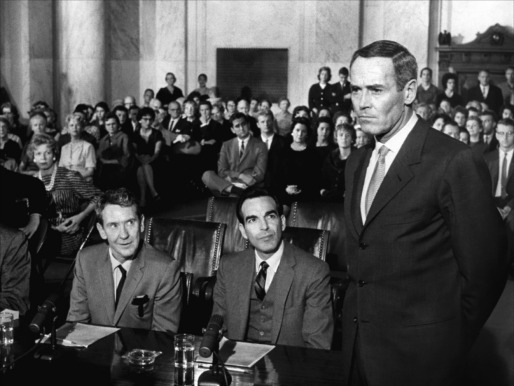
In the real world, then and now, with these words the nominating process would be over. Even with Senatorial deference to the president on who he wants to advise himjust nine nominees have been defeated since George Washington and another 12 withdrawnthis would have been the end of Leffingwell as a candidate for Secretary of State. No government can afford to foreclose policy this way, and short of William Jennings Bryan, who resigned as Woodrow Wilsons Secretary of State because he felt the presidents response to the German submarine sinking of the Lusitania was too aggressive (Wilsons response boiled down to, Stop that, but Bryan fled anyway), its hard to imagine any serious advisor advocating as restrictive a peace policy, tantamount to self-disarmament, as Leffingwell does here. Drury, though, has Leffingwell double down. Suppose, says Richardson, the Russians demanded some strategic concessions from the United States, backed by the threat of immediate military retaliation:
It might be necessary, under the conditions you state, Senator, the nominee said gravely, to concede in some degree to those demands, providing there were some concessions on the other side. I think that might permit us to live with the situation.
And keep our freedom? Senator Richardson asked sharply.
And keep our freedom, Bob Leffingwell said.
The Senator looked at him curiously.
But where do we stop yielding? he asked. At what point do we say, No, it goes no further. This is where you stop and where we stand up for the things we believe in? Do you have such a point in your own mind?
Bob Leffingwell spread his hands again in that curious, candid gesture. All I can tell you, he said patiently, is that it would have to depend on the situation as it then existed, Senator. Then his voice strengthened and he straightened in his chair. But I tell you this, and I care not who challenges it: I will never recommend war to the President of the United States if I become his Secretary of State. Never!
This exchange is one of several tells about the novels political point of view. Another comes early in the book, when the Senate Majority Leader reflects on opposition-party efforts to scuttle the nomination: A series of names and faces flashed across Bob Munsons mindthe Minority, good men and true, good friends and good enemies, and brothers in the bond. The Senate, in other words, neither plays politics nor indulges it demagoguery. The events of the book will disprove this, but only on the liberal side of the aisle.
This was not the story Preminger was interested in telling. The Senate itselfour remarkable system of checks and balanceswill be the hero, he said (Foster Hirsch, Otto Preminger: The Man Who Would Be King, 350). Preminger expanded on this theme to Peter Bogdanovich:
For me, theres an interesting story in showing how American government functions. The film has some very sharp criticisms of our way of government, and it was wonderful that I had the freedom to do this. Its amazing that the American government permits a picture like this to be made. This film proved to me that, in spite of all the beefs you hear, this is really the only free country, where you have free expression. Making Advise and Consent was very important to me in that sense. (Peter Bogdanovich, Who the Devil Made It, 633; emphasis in original.)
Preminger and screenwriter Wendell Mayes decaffeinated the novel, making Leffingwell less of a rigid ideologue and more of a flexible thinker who is, in his words, eager to discard the outworn principles of the past when we find those principles standing in the way of affirmative action for peace. Preminger truncates the I will never recommend war Never! exchange cited above so that when Leffingwell is posed the hypothetical about Russian blackmail he deflects it, saying that the United States should reject any such demand and that it was an unlikely scenario in any case given Americas power of retaliation. Asked if he would recommend a preventative attack, Leffingwell replies, No I would first try to bargain, try to agree to some of their demands if they would agree to some of ours. That qualifying first try, which reserves recourse to war if bargaining should fail, is the difference between Drurys strawman and Premingers more complex presentation of the risks and benefits of an egghead presidential advisor.
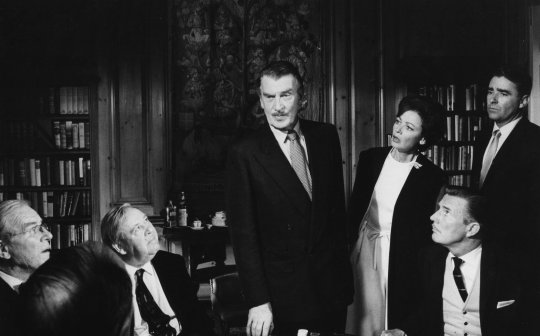
Juggling a large cast and telling the story in straightforward chronological fashion means that despite an all-star cast, the film has no stars. Fonda is absent for the last third of the film as the focus moves away from the nominee to the consequences of the nomination. Majority leader Bob Munson (Walter Pidgeon), seemingly set up as the films point of view character in the opening scenes, takes a back seat as soon as the action switches to the hearings. Gene Tierney, whom Preminger helped boost to the top ranks of stardom by making her the mystery at the center of Laura, was making a comeback here after seven years off the big screen due to mental health issues. She barely registers as a Washington hostess/Munsons mistress, though any actress would have had a hard time making convincing love to the wooden Pidgeon, who was 23 years her senior and as always emphasized diction over all other qualitiesin a career spanning over 50 years, Pidgeon never let characterization get in the way of good elocution.
(Wheels within wheels: Tierney, here having an affair with a senator, had a real-life affair with future Senator John F. Kennedy in the 1940s. One of her A&C costars, Peter Lawford, playing a womanizing senator inspired by Kennedy, was Kennedys brother-in-law.)
Laughtons acting choices are too overdetermined to dominate the picture despite having the showiest part. To get his accent right, the Yorkshire-born actor studied Southern pols like the longtime Mississippi senator John Stennis; the result, whether by choice or as a result of his illnessStennis sounded nothing like Laughton does in the filmis a breathless bullfrog drawl that at times slides into unintelligibility. Burgess Meredith has a cameo notable for going big in a film in which all the other actors are so buttoned down, but then hes gone. The climax is left to journeyman Don Murray, whose story contains a visit to a New York gay bar that plays uncomfortably like the cantina scene from Star Wars. The part needed an actor like Paul Newman, whom Preminger had directed in his previous film, Exodus, but was difficult to cast due to the subject matter.
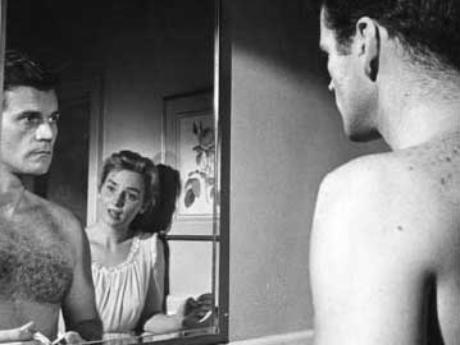
Because of Premingers decision to emphasize the Platonic ideal of the Senate as conceived in the Constitution and confined by a Greek Revival cage, actors tend to disappear into the films bigger than life sets, including an accurate reconstruction of the Capitols Senate chamber. With a background in theater, Preminger eschewed close-ups, reaction shots, and cutting in general in favor of unbroken tracking shots that follow the actors as they walk and talk down hallways and streets. (One feels sorry for the overweight, sickly Laughtonhe would die not long after the films releasefor having to deliver his lines while panting to keep up with Premingers camera on rails.) The film, shot by 1959 Oscar winner Sam Leavitt, has some terrific compositions, but the characters shrink against giant corridors and hearing rooms. Mice in a marble maze, they are transientanguished, but nonetheless temporary. It is the governmental edifice that is permanent.
This is a point, to be sure, but as drama it is the cold stuff of observing action in a petri dish. More importantly, it overrates the solidity of the institution. The inmates can bend and warp it beyond recognition. Preminger and Frank Capra were very different both as men and directors, but one commonality they share is that, perhaps as immigrants who fell in love with their adopted countryCapra came to the U.S. from Sicily at age five; Preminger, born in the eastern Austro-Hungarian Empire and a longtime resident of Vienna, went to Hollywood just before his 30th birthdaythey tended to be so awed by American freedoms and the elegance of its Constitutional structure that they placed the latter on too high a pedestal. Mr. Smith Goes to Washington doesnt know that Jimmy Stewarts Jefferson Smith is the films villain, but he is nonetheless, while Advise & Consent congratulates the Senate forwell, nothing, really. Leffingwell isnt confirmed and he isnt rejected. Preminger, departing from the novel, used a deus ex machina combined with a Constitutional impossibility to get out of the corner into which the film has painted itself, a no-win situation in which the machine-like function of the government which Preminger intended to celebrate is shown to have a good deal of sand in its gears. Leffingwell has been revealed as a deeply flawed candidate, the men passing judgment on him are shown to be even more flawed, and at best the non-resolution is the inadvertent revelation that our procedures are not equipped to deal with a potential leader whose views dont fit into preferred ideological boxes.
*
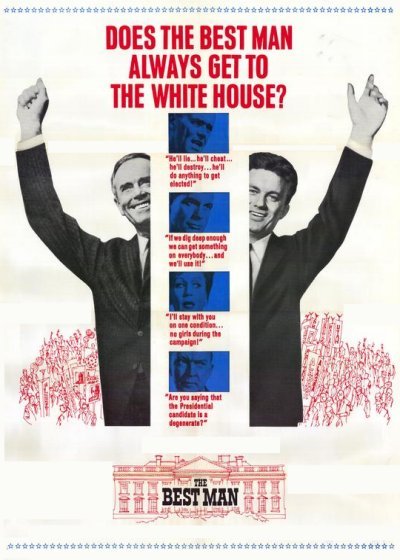
The plot of The Best Man is easily summarized. As Brooks Atkinson put it in his review of the original play for the New York Times, All that happens, really, is that a scrupulous candidate for the nomination tangles with an unscrupulous candidate. The greater issue is whether the scrupulous candidate will descend to the level of the unscrupulous candidate and, in self-defense, engage in character assassination. The Best Man takes place almost entirely in suites at the Ambassador Hotel in Los Angeles, where a contested nominating convention is being held. (An eerie postscript to the film: The Ambassador was the location of Robert Kennedys fatal shooting in 1968.) Former Secretary of State William Russell (Henry Fonda again) is the thinking mans candidate, and right off the bat this is presented as a handicap:
REPORTER
Do you think people mistrust intellectuals like you in politics?
RUSSELL
Intellectual? You mean I wrote a book? Well, as Bertrand Russell said, people in a democracy tend to think they have less to fear from a stupid man than an intelligent one. I think its the other way around. I think its the stupid man.
Russell is vying with Senator Joseph Cantwell (Cliff Robertson), a demagogic reactionary, for the presidential nomination. Cantwell, Russell observes, would do anything to win [and] that makes him dangerous. Cantwell allows that his tactics upset a lot of people, particularly criminals and communists. Both are eager to receive the career-making endorsement of former president Arthur Hockstader (Lee Tracy, the fast-talking Depression-era star, making what would be a one-time, Oscar-nominated comeback after 17 years spent mostly in television and on stage).
I wanted to present to an audience of voters, Vidal said, a small essay in Presidential temperament. To oversimplify Vidals characters, who dont have perfect real-world analogues, the film can be seen as a three-hander in which Fonda/Adlai Stevenson (with a dash of JFK, which is to say Russell is a womanizer) and Robertson/Richard Nixon happen to share the same political party and their pursuit of the presidential nomination is mediated by Tracy/Harry Truman.
In short, its a contrived situation, and not only because contested conventions just dont happen anymore.
In an essay on the film, Richard Nixon: Not the Best Mans Best Man, (Esquire, December, 1983) Vidal disclaimed using Nixon as a model for Cantwell, and further insisted that those who thought he had were missing the point, because Nixon wasnt all that unique:
To understand Nixons career you would have to understand the United States in the twentieth century, and that is something that our educational, political, and media establishments are not about to help us do. After all: no myth, no nation. They have a vested interest in maintaining our ignorance, and that is why we are currently stuck with the peculiar notion that Nixon just happened to be the one bad apple in a splendid barrel. The fact that there has not been a good or serious president since Franklin Roosevelt is ignored, while the fact that Nixon was corrupt some of the time, and complex and devious all of the time is constantly emphasized in order to make him appear uniquely sleazy Yet Nixon is hardly atypical. Certainly his predecessor, Lyndon Johnson, far surpassed Nixon when it came to mendacity and corruption. But the national myth requires, periodically, a scapegoat; hence Nixons turn in the barrel.
With this in mind, the films opening creditsa series of portraits of the presidents in order from George Washington to Lyndon Johnsonbecomes not just a historical pageant, but subversive: These are not statesmen, chosen by divine providence; they are politicians, one much like any other. By the time the viewer has transited from Washington to Calvin Coolidge in full Native American feather headdress, its difficult not to reflect on the films title and conclude we have fallen a long way from Eden.
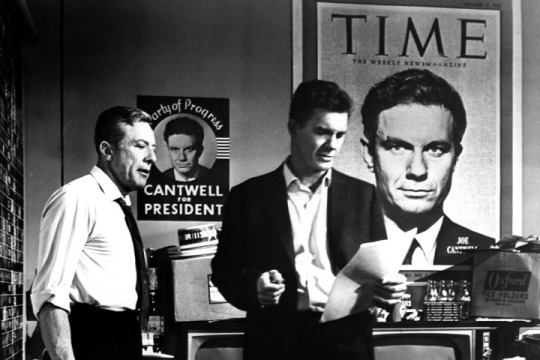
The credits aside, The Best Man isnt much to look at; it sings with the authors trademark acid wit, but visually its still a play. Vidal avoided potential handling by an auteur, however past it he was by the 1960s, when he rejected studio United Artists initial choice of director Frank Capra, the man who sent Mr. Smith to Washington. Vidal recalled:
Suddenly Capra was inspired. Lets open this up, he said, small bright eyes like black olives. At the convention, on the first day, our good guywell get Stewart or maybe Fondahe goes out into the crowd, where all these little people are theyou know, delegates. What, I asked, masking my inner despair Does he say to them thats going to be so important? Capra was radiant in his vision. He quotes Lincoln to them. Now then, get this, he dresses up as Abraham Lincoln. Then he gives them the Gettysburg Address, or something. I said that I thought that this was truly inspired. Then I went to United Artists and got Capra off the movie and put myself in control. (Fred Kaplan, Gore Vidal: A Biography, 535)
Vidals characters retain their integrity, free of what used to be called Capra-corn, but at the cost of the opening-up, both visually and dramatically, that Capra correctly detected was needed. Both of the main characters non-political life is addressed through scenes with their wives that are calculated to be counterintuitive. The thoughtful Russell is estranged from his wronged wife (Margaret Leighton), who only reluctantly campaigns for him and accepts that even if her husband wins the White House, the upside for her, insofar as their relationship goes, would be an ambiguous encounter in the Lincoln Bedroom. Conversely, the hard-nosed Cantwell becomes a puddle of baby-talking mush around his aggressively supportive and sexually engaged spouse (Edie Adams). The two call each other Papa Bear and Mama Bear.
The problem, however, is that we largely dont see the two act as politicians, people who have to charm a crowd. Fonda played a number of politicians during his long career, but theyre not a great fit for him; his laconic Midwestern reserve makes it hard to imagine him going out and giving a rabble-rousing speech at a rally. Even his Young Mr. Lincoln was more wistful and sly than commanding, qualities which may be more accurate than the Disneyland Great Moments With Mr. Lincoln version but is far from the mold of the modern politicianeven No Drama Obama can heat up a room. Robertson, who had just played a young JFK in PT 109, chooses not to imitate any of that politicians smooth charm, nor does he display any of Nixons insecurity and pathetic need to ingratiate himself. Cantwell is a feral creature who does nothing but attack. Even in the scenes with Adams, there are suggestions that Papa Bear is only a mask he wears.
When Hockstader hesitates to choose a candidate and then is sidelined by illness, Russell and Cantwell are forced to seek an edge with the only weapons left to them: The dirt each has on the other. Anticipating Thomas Eagleton, George McGoverns momentary running mate in 1972, Russell has had a nervous breakdown and been treated for manic depression and paranoia, while Cantwell just might have had a homosexual affair while in the military. This is the same leverage applied to Brig Anderson in Advise & Consent and suggests that Vidal was right when he said he wanted to show that, in our confused age, morality means, simply, sex found out. To most Americans, cheating, character-assassination, hypocrisy, self-seeking are taken as the way things are, not pleasant perhaps but: son youve got to look after number one. (Jay Parini, Gore Vidal: Writer Against the Grain)
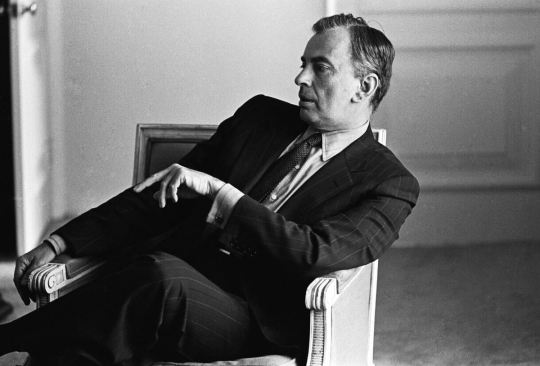
Each candidates reaction to the leverage the others secrets provide proves to be a test of presidential fitness in unexpected ways, as the viewer is asked to weigh whether Cantwells lack of empathy is more disqualifying than Russells shaky morality. Or do those qualities make them better candidates? One by one, these compromises, these small corruptions, Russell says, destroy character. That he might care about that more than results is troubling to the other characters in the film. As one politician says of the Fonda character, He feels! He thinks! He sits! Hockstader makes the comparison explicit in a speech to Russell:
I am here to tell you this: Power is not a toy we give to good children. It is a weapon. And the strong man takes it and uses it. If you dont go down there and beat Joe Cantwell to the floor with this very dirty stick, then you’ve got no business in the big league. Because if you dont fight, this job is not for you. And it never will be.
Vidals initial ending was that Cantwell, the Nixonian figure, wins the nomination. He felt this was so pessimistic as to condemn the play to commercial failure, so he changed it. The replacement ending, as depicted in the film, is actually darker, sliding past pessimism into pure nihilism. In its idiot way our system, though it usually keeps us from having the very best man as president, does protect us from the very worst, Vidal said. Two cheers for democracy. (Parini) Fonda exits the film saying, I am, of course, happy that the best man won. It is impossible to believe that this is what has just happened.
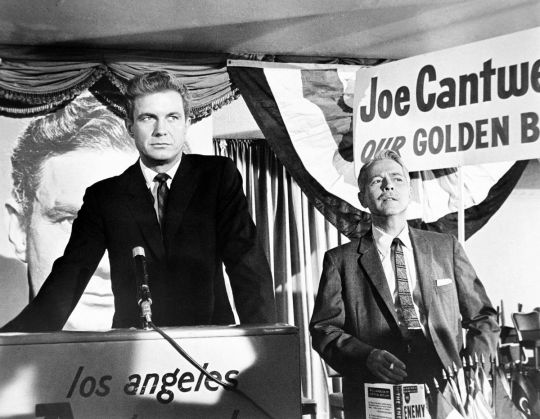
By the time these films made their way from page and stage to screen, the election that had prompted them had been decided, though only in a manner of speakingthe electorate gave a nervous shrug and tore in half. The popular vote went to Kennedy, 49.7 percent to 49.6, with enough chicanery on both sides (the dead of Chicago rose up and voted for JFK, though there was pro-Nixon fraud as well) that we will never know who actually won.
On May 22, 1960, the New York Times Magazine published a takedown of both of these stories. Political reporter Douglass Cater strongly objected to their portrayal of American leaders as being so flawed:
Drurys Presidency is described at one point as utterly removed from the normal morality that holds society together. An immoral President?
Vidals ex-President remarks incredulously. They hardly come in any other size.
We recollect in our history strong Presidents and weak Presidents. But we never think of good Presidents and evil Presidents, for the simple reason that we have never had an evil President. White House politics is played on a higher level than courthouse politics, even when the occupant of the White House was formerly a courthouse politician.
Oddly, his assessment corresponds with the far more cynical Vidals: Institutional democracy would save us from our worst electoral urges. Yet its harder to say that today than ever before, and would have been even shortly after the films were out of theaters. The nation was about to go through the nadir of the Civil Rights crisis, which Kennedy initially mishandled; the disastrous Bay of Pigs invasion; and the Cuban Missile Crisis, which Kennedy arguably escalated before successfully negotiating a way out of nuclear Armageddon. It was also making a beeline for Vietnam and twice electing Nixon, and onward. Before Kennedy was assassinated, there was a new vogue in political films, this time with thrillers like The Manchurian Candidate and Seven Days in May (both directed by John Frankenheimer), which were concerned with presidents and presidential candidates so bad that they have to be removed via assassination or a coup.
And these, too, were followed by films such as Dr. Strangelove and Fail-Safe (both 1964, the latter with Fonda as the president), which suggested that the game of Mutually Assured Destruction was so badly rigged that it didnt matter much who the president iswhich, as Lyndon Johnson would demonstrate in his reelection campaign against Senator Barry Goldwater in 1964, actually makes each election more important, not less. As Cantwell says to Russell at the climax of The Best Man, You dont understand me. You dont understand politics. You dont understand this country, this way it is and the way we are. Youre a fool.
Given that we can no longer pretend the way these films do, maybe he was right.
